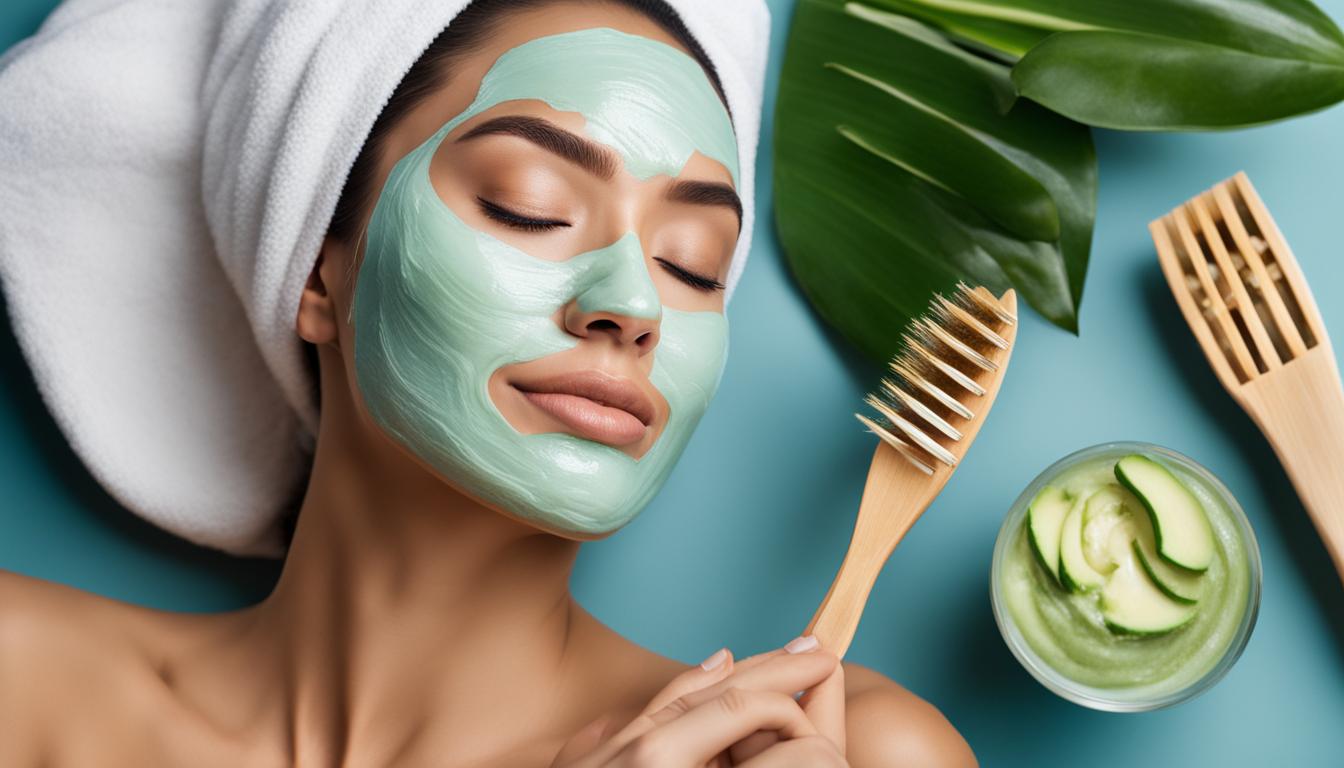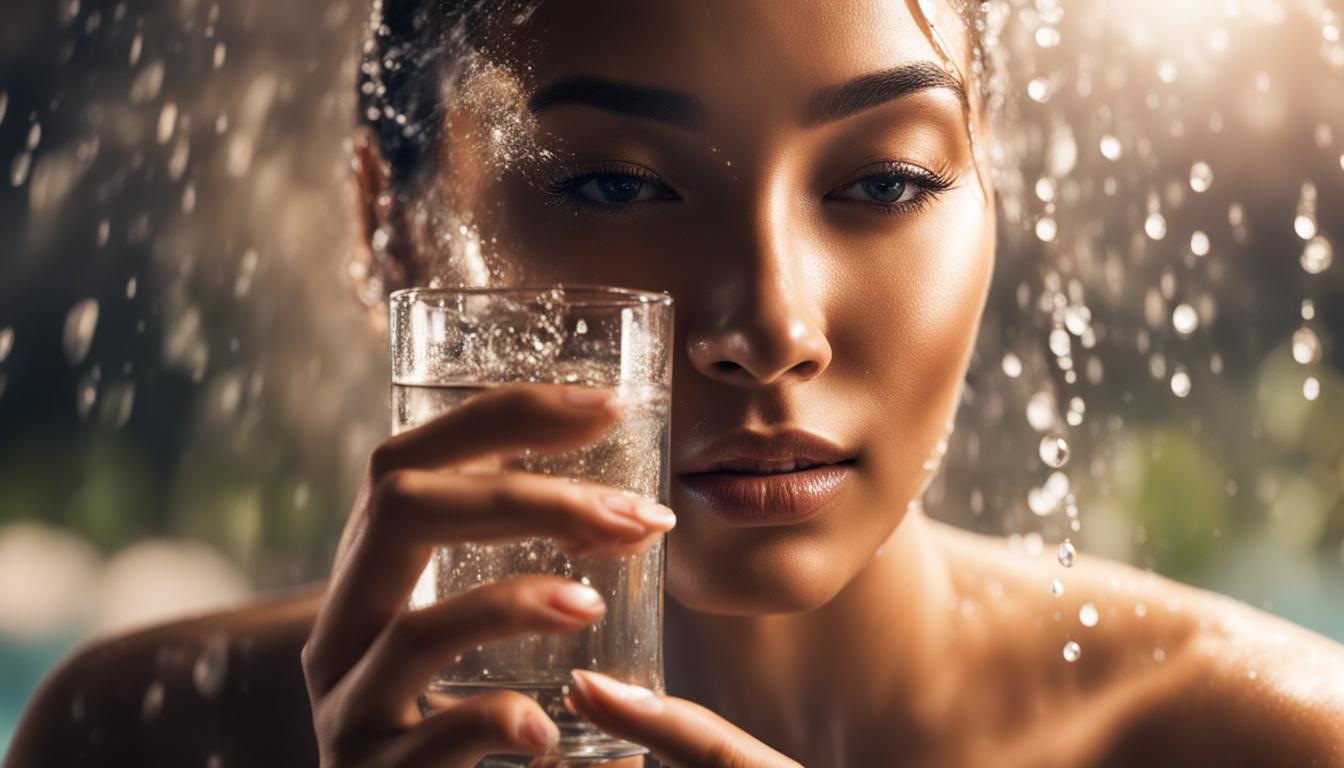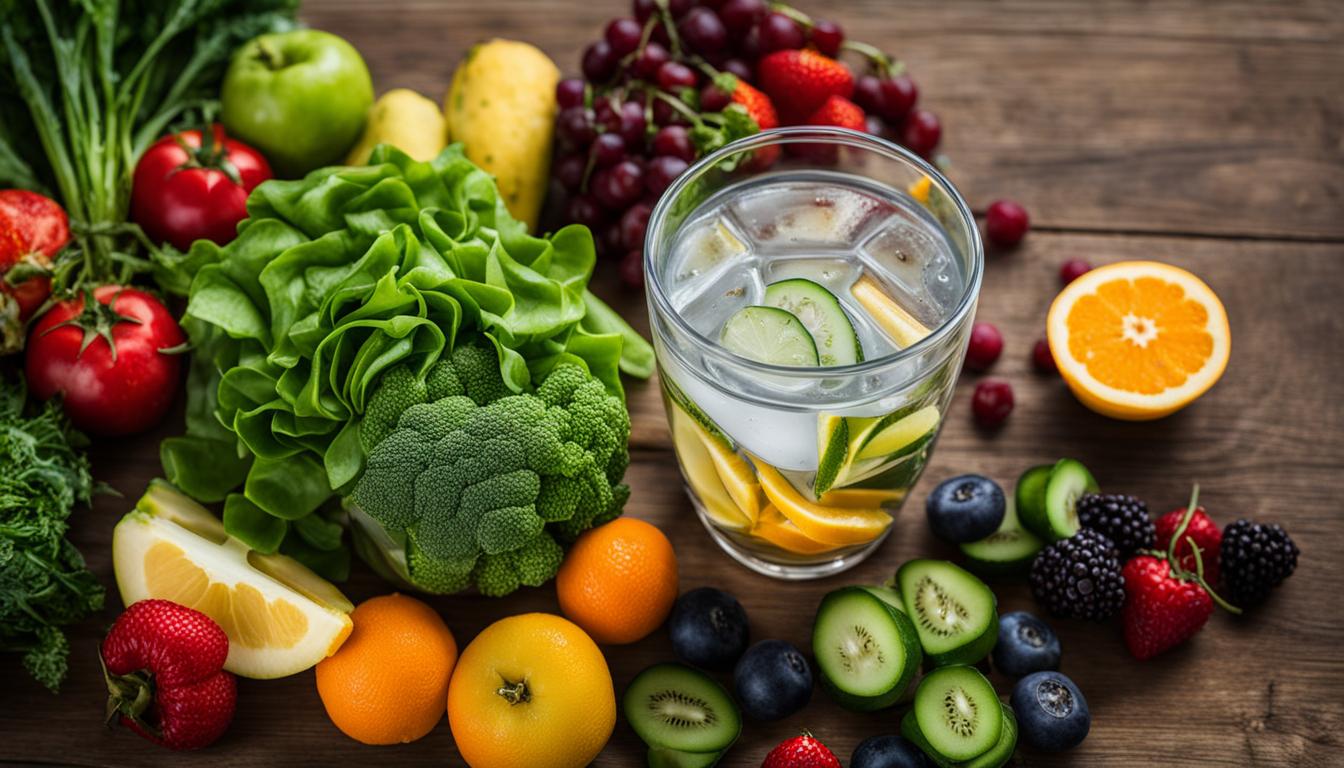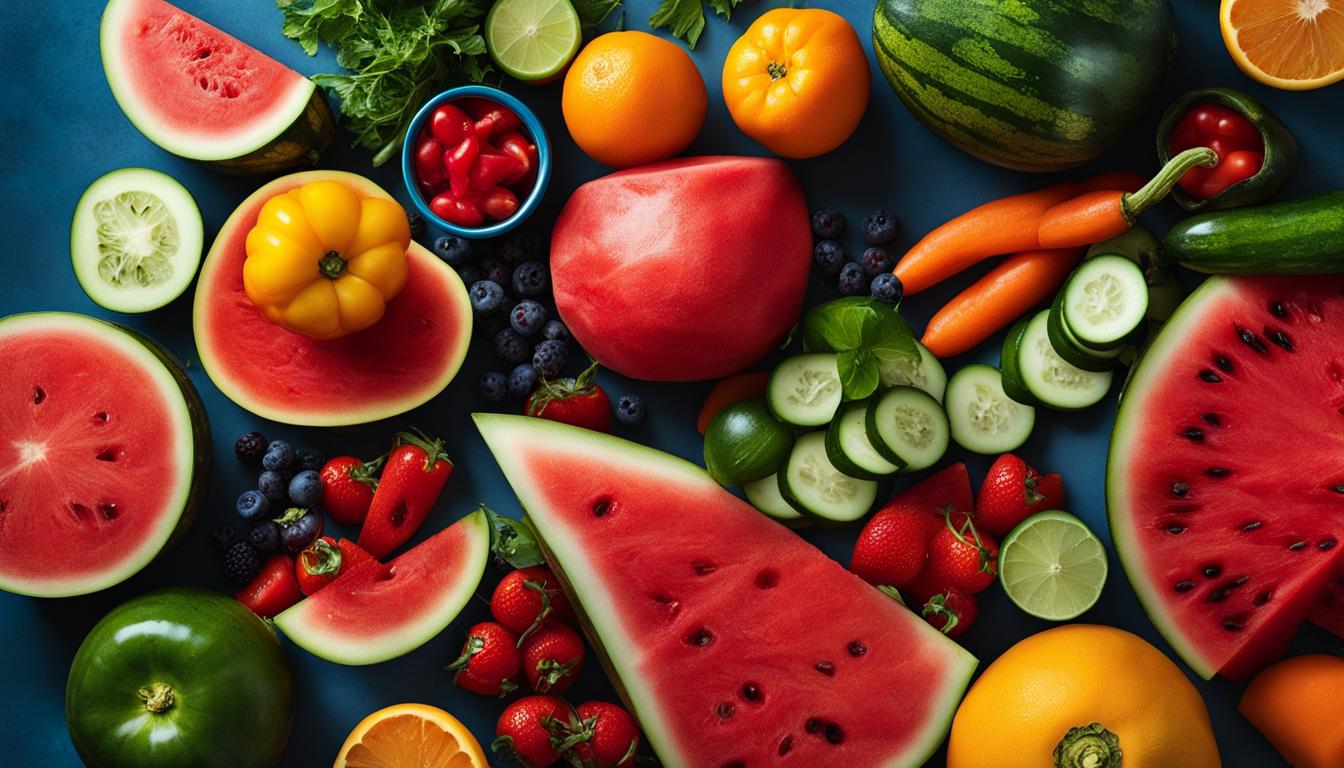Keeping your skin properly hydrated is crucial for maintaining its health and preventing damage. When your skin lacks moisture, it becomes more vulnerable to cracking, dryness, and other issues. But fear not, because we have the top tips to help you hydrate your skin and achieve a glowing complexion.
Whether you have dry skin or are dealing with dehydration, these tips will work wonders for you. We’ll cover everything from understanding the signs of dehydrated or dry skin to incorporating hydrating ingredients into your skincare routine. Plus, we’ll discuss the importance of your skin’s natural moisture barrier and how diet plays a role in skin hydration.
So, if you’re ready to unlock the secrets to hydrated skin, keep reading for our expert advice and recommendations for the best moisturizers for hydrated skin.
Key Takeaways:
- Properly hydrating your skin is essential for maintaining its health and preventing damage.
- Dry skin lacks oil, while dehydrated skin lacks water, but it’s possible to have both conditions simultaneously.
- Adopting certain habits and using products with hydrating ingredients can help hydrate your skin effectively.
- Protecting and repairing your skin’s moisture barrier is crucial for maintaining skin hydration.
- Your diet plays a significant role in skin hydration, so consume foods that are rich in essential fatty acids and antioxidants.
Signs of Dehydrated or Dry Skin
When it comes to assessing your skin’s hydration levels, it’s important to understand the signs of both dehydrated and dry skin. While these conditions share some similarities, they also have distinct characteristics that can help you determine which one you’re experiencing.
Dehydrated skin:
- Appears dull and lackluster
- May not be flaky or rough
- Lacks elasticity and resiliency
- Tents or remains slightly wrinkled when pinched
Dry skin:
- Feels rough and flaky
- Looks dull and may have a powdery appearance
- Can be tight and itchy
- May experience cracking or peeling
In some cases, you may have both dry and dehydrated skin simultaneously. Dryness can impair the skin’s barrier function, leading to increased water loss and dehydration. Understanding these signs will help you address your skin concerns effectively.
Tips for Hydrating Your Skin
If you want to achieve and maintain hydrated skin, there are several effective tips and practices that you can incorporate into your skincare routine. By following these tips, you can help to keep your skin moisturized and healthy:
- Avoid hot showers and baths, as they can dehydrate the skin. Opt for lukewarm showers instead.
- Use a humidifier in your home to increase the humidity and prevent moisture loss from your skin.
- Choose gentle cleansers that do not strip the skin of its natural oils.
- Avoid over-cleansing and limit washing your face to twice a day.
- Leave your skin slightly damp after cleansing to enhance the absorption of moisturizer.
- Look for skincare products that contain hydrating ingredients like hyaluronic acid, glycerin, ceramides, and fatty acids.
- Always wear sunscreen to protect your skin from UV damage.
- Use a heavier moisturizer at night to lock in moisture while you sleep.
- Exfoliate weekly to remove dead skin cells and allow moisturizers to penetrate better.
- Incorporate hydrating sheet masks into your skincare routine once a week.
- Consider using a thermal water spray to hydrate and soothe your skin.
- Choose makeup products that contain moisturizing ingredients and SPF protection.
- Drink plenty of water and eat water- and antioxidant-rich foods to hydrate your skin from the inside.
- Avoid dehydrating drinks and foods, such as alcohol, excessive coffee, and processed foods.
By following these tips and practices, you can ensure that your skin stays hydrated, moisturized, and healthy. Remember to be consistent and listen to your skin’s needs to achieve the best results.

Importance of Moisture Barrier
The skin’s moisture barrier, composed of cholesterol, fatty acids, and ceramides, plays a vital role in keeping the skin hydrated and protected. This barrier acts as a shield, preventing moisture loss and keeping harmful substances out. When the moisture barrier is compromised, the skin becomes more vulnerable to dryness, irritation, and other skin issues.
Various factors can damage the moisture barrier, such as extreme temperatures, dry air, harsh ingredients, excessive washing, and dehydration. These factors disrupt the skin’s natural balance, causing the moisture barrier to weaken and lose its ability to retain moisture effectively.
Repairing and maintaining a healthy moisture barrier is crucial for optimal skin hydration. By strengthening the barrier, the skin can retain moisture more efficiently, resulting in a hydrated and healthy complexion.
“A well-maintained moisture barrier is essential for preventing dryness and maintaining healthy skin hydration.”
To repair the moisture barrier, it’s important to incorporate proper skincare practices into your routine. Use gentle cleansers that do not strip away the skin’s natural oils and opt for moisturizers that contain beneficial ingredients like ceramides, hyaluronic acid, and fatty acids. These ingredients help replenish the skin’s moisture levels and strengthen the barrier.
Additionally, maintaining adequate hydration levels by drinking plenty of water, using a humidifier to combat dry air, and protecting the skin from extreme weather conditions can further support the health of the moisture barrier.
Repairing and sustaining a healthy moisture barrier is key to maintaining optimal skin hydration, preventing dryness, and promoting overall skin health.
Quick Tips to Hydrate Your Skin
Properly hydrating your skin is essential for achieving healthy and glowing skin. Whether you’re looking to boost moisture, maintain hydration, or quickly revitalize dry skin, these quick tips can help you achieve the desired results. Incorporate these skin hydration tips into your daily routine to effectively hydrate your skin and promote a radiant complexion.
- Get enough sleep: Aim for 8 to 9 hours of quality sleep to support your skin’s healing process and promote hydration.
- Stay hydrated from within: Drink an adequate amount of water throughout the day to replenish moisture levels and keep your skin hydrated.
- Limit coffee and alcohol consumption: Coffee and alcohol can contribute to dehydration, so it’s important to moderate your intake for optimal skin hydration.
- Switch to a gentle cleanser: Use a cleanser that won’t strip your skin of its natural oils, helping to maintain its moisture barrier. Look for gentle cleansers with hydrating ingredients.
- Moisturize immediately after cleansing: Apply a moisturizer while your skin is still damp after cleansing to seal in moisture and prevent water loss.
- Use a humidifier: Running a humidifier in your home can increase humidity levels, preventing moisture loss from your skin and keeping it hydrated.
- Opt for a silk or satin pillowcase: Choose a pillowcase made of silk or satin to minimize friction and protect your skin from moisture loss while you sleep.
- Check your cleanser’s labeling: Avoid harsh ingredients that can strip your skin, leading to dryness and dehydration.
- Choose products with hydrating ingredients: Look for skincare products containing hydrating ingredients like ceramides, hyaluronic acid, lipids, and fatty acids to deeply moisturize your skin.
- Incorporate a hydrating sleep mask: Add a hydrating sleep mask to your nighttime routine to provide an extra boost of moisture while you sleep.
- Protect your skin from external factors: Shield your skin from the sun’s harmful rays, wind, and cold temperatures by wearing appropriate clothing and sunscreen.
- Create a moisture barrier: In severe cases of dehydration, consider using petroleum jelly to create a protective barrier that locks in moisture.
- Reduce stress levels: High levels of stress can impact your skin’s hydration. Engage in stress-relieving activities like meditation, yoga, or spending time in nature.
By following these simple yet effective tips, you can hydrate your skin quickly, boost skin moisture, and achieve a healthy, radiant complexion.

How to Test Skin Hydration Level
Testing the hydration level of your skin is a simple yet effective way to determine its moisture content. The test involves pinching the fleshy part of your skin and observing how quickly it snaps back into place. This method provides insight into the hydration level of your skin, helping you assess the effectiveness of your hydration efforts.
Procedure:
- Start by selecting a fleshy area of your skin, such as the back of your hand or forearm.
- Lightly pinch the skin between your thumb and forefinger.
- Release the pinch and observe how quickly the skin returns to its initial position.
Interpretation:
- If the skin snaps back immediately or quickly, it indicates that your skin is well-hydrated, and the moisture level is optimal.
- If the skin takes some time to snap back, or if it remains tented or wrinkle-like after releasing the pinch, it suggests that your skin is dehydrated and lacks moisture.
By regularly testing your skin’s hydration level, you can track its moisture content and make necessary adjustments to your skincare routine. Remember that maintaining proper skin hydration is essential for a healthy and radiant complexion.
Simple test to determine your skin’s hydration level
3-Day Guide to Hydrated Skin
Follow this 3-day guide to achieve hydrated skin in a short period:
Day 1:
- Get 8 to 9 hours of quality sleep to support skin repair.
- Drink plenty of water throughout the day.
- Switch to a soft, non-absorbent pillowcase to minimize moisture loss.
- Check your cleanser’s ingredients and switch to a gentler option if necessary.
Day 2:
- Wake up early and ensure you get enough sleep.
- Eat foods rich in essential fatty acids like salmon or almonds.
- Choose hydrating skincare products with ingredients like ceramides, hyaluronic acid, and lipids.
- Use a hydrating sleep mask overnight.
Day 3:
- Wake up early and be mindful of your sleep patterns.
- Enjoy a meal with foods that promote skin hydration, like sweet potatoes or fruits high in water content.
- Apply sunscreen before heading outside.
- Use petroleum jelly to create an extra barrier for severely dehydrated skin.

Follow this 3-day guide to kickstart your journey towards hydrated and nourished skin. Remember, consistent efforts and a comprehensive approach are key to achieving and maintaining skin hydration.
Take Care of Your Skin’s Natural Barrier
Your skin’s natural barrier is a vital component in maintaining healthy and hydrated skin. This barrier acts as a protective shield, preserving moisture and defending against external factors that can cause damage. To ensure the health and integrity of your skin’s natural barrier, it’s important to adopt a gentle skincare routine that promotes balance and nourishment.
When caring for your skin’s natural barrier, avoid using harsh chemicals and abrasive exfoliants that can strip away essential oils and disrupt the delicate balance of your skin. Opt for gentle cleansers and skincare products specifically formulated to respect the skin’s natural pH and moisture levels.
Additionally, refrain from scrubbing your skin too roughly, as this can weaken the barrier and potentially lead to inflammation and sensitivity. Instead, cleanse and exfoliate with gentle circular motions, allowing the products to work effectively without causing harm.
Protecting your skin from environmental damage is another crucial aspect of maintaining a healthy skin barrier. Shield your skin from the harmful effects of UV radiation by wearing broad-spectrum sunscreen every day, even on cloudy days. Furthermore, consider using antioxidant-rich skincare products that help combat free radicals and prevent premature aging.
By prioritizing the care of your skin’s natural barrier, you can safeguard its ability to retain moisture, defend against external stressors, and maintain a healthy and radiant complexion.
Quick Tips to Take Care of Your Skin’s Natural Barrier:
- Choose gentle skincare products that respect your skin’s natural pH and moisture levels.
- Avoid harsh chemicals and abrasive exfoliants that can disrupt the skin’s balance.
- Protect your skin from environmental damage by wearing broad-spectrum sunscreen daily.
- Consider using antioxidant-rich skincare products to combat free radicals.
With these simple yet effective tips, you can nurture and preserve your skin’s natural barrier, allowing it to function optimally in maintaining healthy and hydrated skin.
Importance of Diet for Skin Hydration
Your diet plays a significant role in the hydration of your skin. Consuming a healthy and balanced diet can help keep your skin hydrated from the inside out. Incorporating foods that are rich in essential fatty acids, antioxidants, and water content into your daily meals can promote skin hydration and overall skin health.
Foods for Hydrated Skin
Include the following foods in your diet to promote skin hydration:
| Food | Benefits |
|---|---|
| Avocados | Rich in healthy fats and vitamin E, which nourish the skin and improve hydration. |
| Almonds | Contain omega-3 fatty acids that help maintain skin elasticity and hydration. |
| Walnuts | High in omega-3 fatty acids and antioxidants that support skin health and hydration. |
| Cucumbers | Have high water content, which helps hydrate the skin from within. |
| Watermelon | Rich in water and antioxidants, providing a hydrating and refreshing effect on the skin. |
These foods not only hydrate your skin but also provide essential nutrients that contribute to its overall health and appearance.
Remember, a healthy diet is not a replacement for a proper skincare routine but works synergistically with it. By incorporating hydrating foods into your diet and using skincare products that contain hydrating ingredients, you can maintain optimal skin hydration.

By nourishing your skin from within, you can achieve a hydrated and radiant complexion. Remember to consult with a healthcare professional or dermatologist for personalized advice on maintaining a healthy diet and skincare routine.
Choosing the Right Skincare Products
When it comes to selecting the perfect skincare products, it’s crucial to pay attention to the ingredients and choose options that are both hydrating and gentle on the skin. By opting for the right products, you can ensure that your skincare routine effectively nourishes and moisturizes your skin, resulting in a healthy and radiant complexion.
When searching for hydrating skincare products, look for key ingredients known for their moisturizing properties. These include:
| Key Ingredients | Description |
|---|---|
| Hyaluronic Acid | Retains moisture and plumps the skin, promoting hydration. |
| Ceramides | Helps to strengthen the skin’s natural barrier and locks in moisture. |
| Jojoba Oil | A lightweight oil that provides deep nourishment and hydration. |
| Shea Butter | An excellent emollient that soothes and moisturizes the skin. |
| Aloe Vera | Known for its calming properties and ability to hydrate the skin. |
By incorporating skincare products that contain these hydrating ingredients into your routine, you can effectively replenish moisture and promote a healthy complexion. Additionally, consider any underlying skin conditions, such as eczema, and choose products specifically formulated to address those concerns.
Remember, everyone’s skin is unique, so it may take some trial and error to find the perfect combination of products that work for you. Pay attention to how your skin responds and adjust your skincare routine accordingly.
When it comes to hydrating your skin, the right skincare products can make all the difference. Choose wisely and let your skin glow with health and vitality.
Conclusion
Hydrating your skin is more than just a beauty ritual—it’s an essential step in maintaining the health and well-being of your skin. By implementing the tips and practices mentioned in this article, you can achieve and maintain a hydrated, glowing complexion.
Prioritize the use of gentle and nourishing skincare products that contain hydrating ingredients like hyaluronic acid, ceramides, and aloe vera. Remember to hydrate your skin from the inside out by drinking plenty of water and incorporating water-rich foods into your diet.
Protecting your skin’s natural barrier is crucial for retaining moisture, so be mindful of using harsh chemicals and opt for gentle cleansers and moisturizers. With consistent effort and attention, you can enjoy healthy, hydrated skin that looks and feels its best.
FAQ
How can I hydrate my skin naturally?
To hydrate your skin naturally, you can incorporate habits like drinking enough water, eating water-rich foods, using gentle cleansers, and applying moisturizers with hydrating ingredients like hyaluronic acid, glycerin, and ceramides.
What are the signs of dehydrated skin?
Signs of dehydrated skin include lack of elasticity, tightness, fine lines, and a dull complexion. Dehydrated skin can also feel rough and appear less plump.
How can I repair my skin’s moisture barrier?
To repair your skin’s moisture barrier, you should avoid harsh ingredients, use gentle skincare products, moisturize regularly, and incorporate hydrating ingredients like ceramides and fatty acids into your skincare routine.
How can I test my skin’s hydration level?
An easy way to test your skin’s hydration level is by pinching the fleshy part of your skin and observing how quickly it snaps back into place. Quicker snapback indicates higher hydration levels, while slower snapback suggests dehydration.
What can I do to hydrate my skin quickly?
To quickly hydrate your skin, you can ensure you get enough sleep, drink plenty of water, choose hydrating skincare products with ingredients like hyaluronic acid and lipids, and use a hydrating sleep mask overnight.
How can I take care of my skin’s natural barrier?
To take care of your skin’s natural barrier, avoid using harsh chemicals and scrubbing your skin too roughly. Opt for gentle skincare products that protect your skin from environmental damage and do not disrupt its natural oils.
How does diet affect skin hydration?
Diet plays a significant role in skin hydration. Consuming a healthy diet rich in essential fatty acids, antioxidants, and water-rich foods can help keep your skin hydrated from the inside. Foods like avocados, almonds, and watermelon are known to promote skin hydration.
How do I choose the right skincare products for hydration?
When choosing skincare products for hydration, look for ingredients like hyaluronic acid, ceramides, jojoba oil, and shea butter. Consider any underlying skin conditions and choose products specifically formulated for them.
Why is skin hydration important?
Skin hydration is important for maintaining its health and appearance. Proper hydration helps to keep the skin’s natural barrier intact, preventing dryness, fine lines, and other skin issues. Hydrated skin also looks plump, radiant, and youthful.


